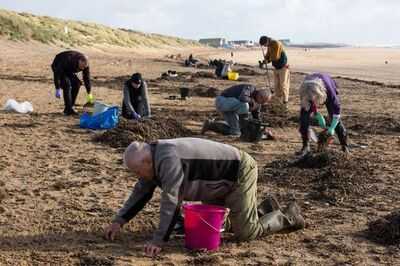
A sudden influx of plastic beads on the shore of a UK beauty spot signals an "environmental catastrophe", according to one MP. Helena Dollimore, Labour MP for Hastings and Rye, raised the alarm over sightings of "millions" of black plastic beads on Camber Sands, East Sussex, in a letter to Southern Water. The "bio-beads", which may have come from local water treatment plants, have been "embedded" along a two-mile stretch of the coastline, Ms Dollimore said.
She suggested the scale of the incident indicated "severe pollution", with a "continuous line of bio-beads" along the seafront, many of which are tangled up in dense seaweed and sand. Camber Sands, a popular tourist spot with three miles of sand dunes, is a designated Site of Nature Conservation Importance (SNCI), with a section to its west also making up part of a Site of Special Scientific Interest (SSSI).
Ms Dollimore said: "The huge number of plastic beads that have washed up here risks an environmental catastrophe. These biobeads are deadly to marine life and wildlife, and we are already seeing more dead seals, fish and porpoises on the beach.
"Local residents are working tirelessly to remove as many beads as possible, but it's a race against time. Southern Water must urgently establish if their local wastewater plants could be the source of these biobeads, and I've asked them to dedicate all available resources to supporting the clean-up operation in the meantime."
Andy Dinsdale, from the campaign group Strandliners, told The Guardian the incident was "the worst pollution event" he had ever seen. "It is contaminated plastic," he explained. "Marine animals will ingest small plastic items once they are in the sea, they will attract algae, they will smell like food, effectively.
"Once they've eaten it, that's it: they can't get it out. They will float on the surface. It will create a slick which attracts plunging seabirds."
Southern Water said it was working closely with the local council and the Environment Agency to "investigate the source" of the bio-beads.
"This investigation work is ongoing," a spokesperson added. "Rother District Council is leading the clean-up of the beach, using specialists with a vehicle with suction equipment to remove the beads. We are also supporting with the clean-up.
"We've conducted water-quality sampling on the beach, which has shown no impact to environmental water quality."
A spokesperson for the Environment Agency said: "We are aware that a large number of plastic nurdles have washed up along a stretch of the coastline in East Sussex which includes Camber Sands.
"We are providing advice and guidance to Rother District Council, which has employed contractors to carry out a clean-up operation. This work is currently underway. We are working with other responders to identify the source of the pollution."
You may also like

NBA trade rumors: Los Angeles Lakers could sign $54 million Dallas Mavericks superstar in a bold move to strengthen roster around Luka Doncic

AIIMS Bhubaneswar provides platform for innovative health-tech Ideas

'Captivating' war series that is 'tough to watch' has 100% rating on Rotten Tomatoes

Princess Kate sends 'secret message' to Prince William with 'bold' gesture

Why has ECI yet to disclose male, female voter turnout in first phase: Tejashwi Yadav







